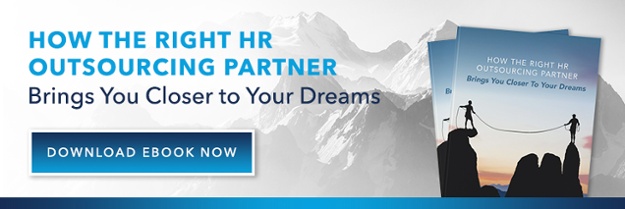Topic Outsourcing HR / PEO
Why HR Outsourcing Is Growing in Popularity
.jpg)
December 3, 2021 | By Christie Obrien
.jpg)
Professional employer organizations (PEOs) are thriving. Between 2008 and 2020, the number of worksite employees (WSEs) employed in the PEO industry grew at a compounded annual rate of 7.6 percent. Since 2008, the annual growth rate has been seven percentage points higher than the overall growth rate for the U.S. employed labor force.
It all comes back to an increase in demand. More and more companies are seeing the value of this comprehensive form of HR outsourcing. So, why are PEOs so popular?
4 Reasons PEOs Are More Popular
Overall, there are four reasons PEOS are becoming ever more popular. Companies see the increased value, and other trends, such as increases in healthcare costs, are making PEOs more attractive. Here are the four reasons:
Cost Reduction
Cost reduction is, more and more, the number one reason why companies outsource HR. At a basic level, outsourcing allows you access to a whole team for a fraction of what it would cost to hire a single HR specialist. This does not mean that outsourcing can or should completely replace your in-house HR department, but it does mean you can put off expanding it and avoid having to hire a full-time employee for part-time needs, such as compliance.
Additionally, PEOs provide the unique ability to save on healthcare and other benefits. Because the PEO becomes the employer of record for your employees, they can be added to the PEO’s master healthcare plan. This generally gives better benefits for a much lower cost and can make the difference between being able to afford competitive benefits and not. Typically, they can also get you a lower workers’ compensation rate both by allowing you to benefit from their claims history and by helping you design an appropriate return-to-work program.
Talent War
It’s a workers’ market out there. Competition for quality talent is heating up and prospective employees have high standards and expectations. They can afford to be picky. Employees are changing jobs to get more flexibility, the ability to work from home, or just because they have realized life is too short to work a job you hate.
Outsourcing HR frees up your in-house team’s time. Instead of processing payroll or answering questions about benefits, they can be dedicated to making your company an employer of choice. They can support a solid company culture, improve employee engagement, and mediate potential disputes before they become a problem. Your employees will know they can go to HR with an issue and get a prompt, professional response from somebody who is not going to snap at them because they are tired and overworked.
Additionally, improved benefits make it easier to compete with larger companies. Many small businesses struggle to hire the talent they need because they simply can’t afford Fortune 500 benefits on their budget. A PEO can make the difference here, giving you the same level of benefits as the big guys, or close enough that you can make up for it in other ways, such as more flexible scheduling.
Focus on Core Business
When your HR team is too small, not only do they become overworked with mundane administrative tasks, but the work starts to overflow onto other departments. The receptionist ends up doing payroll, the office manager is answering benefits questions. If there’s nobody else available, the owner starts to pitch in.
This is bad because it takes away everyone’s focus from core, revenue-generating activities. Outsourcing the time-consuming administrative “work about work” prevents this from happening. Instead, everyone can focus on helping your company grow. You don’t end up with important things not being done because the owner is doing payroll themselves.
HR outsourcing also allows HR themselves to focus on the things which directly benefit the business, such as employee training.
Compliance
As your business grows, compliance becomes ever more complicated. For example, the need to provide a compliant health insurance plan when you hit 50 full-time equivalents.
With remote work, even small businesses can end up with employees in multiple states. Or you might be on the border between jurisdictions and have employees commute across not just local, but state lines. This might mean you have employees who fall under different overtime regulations, different benefits requirements, etc. You need to make sure that you meet all of them and provide equity. This might mean putting everyone under the strictest rules, just to be on the safe side.
Compliance rules also change frequently, especially at more local levels.
Keeping track of these ever-changing requirements is a full-time job, but most small businesses can’t afford a compliance officer. This leaves you open to an increased risk of incurring fines and fees as your company grows. It also leaves you open to employee lawsuits. Are you sure the independent contractor you have doing significant amounts of work doesn’t need to be an employee?
The Future of the PEO Industry
For these four reasons (and many more), the future of the PEO industry looks bright. The only time the trend line has not consistently gone up was during the height of the pandemic when all industries were being disrupted.
The number of PEOs and the number of people employed by them will continue to rise. If you are considering HR outsourcing, consider partnering with a PEO and participating in this future.

Christie Obrien
Christie is a Human Resource Consultant specializing in employee relations, legal compliance, and recruiting.




